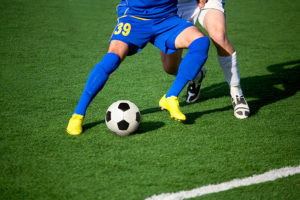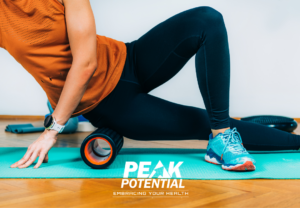
As parents we want our kids to be both active and successful, with athletics being an excellent means to this end. We know the amazing benefits of organized sports and want your children to be able to participate fully.
But, how can we provide those activities that will bring your child health and happiness, while still keeping them safe?
Without knowing your child, I can’t give you the exact steps to take. However,here are some things to prioritize and to avoid that will help ANY teenage athlete reduce injury and improve performance.
1. Prioritize Conditioning
On every team it is inevitable that a handful of athletes will start the season in very poor condition. Once athletes reach high school, most coaches have an established conditioning period. However, this is often only a week or two before competition gets up and rolling. For many athletes, this isn’t enough.
As a parent you can encourage your athlete to get started on training earlier. At this level, 1 month before the season starts is probably sufficient. Simple activities that enhance fitness and athleticism like jogging, swimming, body weight resistance or plyometrics are a great start.
2. Prioritize Adequate Rest
Adequate rest can be a huge variable in preventing injury and improving performance. When we train and breakdown our tissues, we must rest to allow time for those tissues to rebuild.
Another reason why this is so important is, when the body is fatigued it is unable to perform at the same level. Although the brain says it can do the normal movements it is trained to do, the body just cannot respond. They may do well over the summer, but once school starts homework, games, and social events get in the way of teenagers getting the amount of rest their bodies need.
3. Prioritize Fueling the Body
Hydration and nutrition are crucial aspects to human performance and prevention of injuries. In terms of hydration, a good rule of thumb is 32 oz of water for every 1 hour of heavy activity. Just occasionally offer the friendly reminder to your athletes to keep drinking.
Also important to training is keeping up the good building blocks in the body. This includes protein, vitamins, minerals, healthy fats, and antioxidants will keep the body strong and resilient. If an injury occurs, good nutrition is even more important. More questions? Please consult our Fitness Nutrition Specialist.
4. Avoid Over Training
When we stress the bodies tissues to the point of breakdown, without adequate rest time to build them back up we over train. If training is performed with no variation in the activities, intensity, or resistance this is likely to occur.
Over training usually happens in season when athletes are doing the same thing day in and day out. If an athlete is playing the same sport year-round or multiple back-to-back seasons then it’s even more likely. Encourage your athlete to explore new and different activities during their “off season” or during times of recreation.
5. Avoid Early Specialization
This goes hand in hand with over training. . . the much debated early specialization. Proponents say that playing the same sport year round will improve skills and chances of playing at the next level. We are seeing this now even in grade school athletes. The truth is just the opposite usually occurs.
More and more studies are coming out to discourage early specialization. Studies show that multi sport athletes tend to have greater skill acquisition, decreased levels of burn-out, decreased numbers of overuse injuries and a wider range of athletic talent. In the end, you as the parent have the ultimate say in if and when your teenage athlete will specialize.
I could obviously go much more in-depth on ways to decrease risk and improve performance than the principles I’ve given you here. However, these fundamentals, if applied with discipline, will make a huge difference for your child’s high school athletic experience.
If you have further questions or concerns you would like to discuss with one of our duel licensed Athletic Trainers/Physical Therapists, request a FREE call by clicking HERE.



